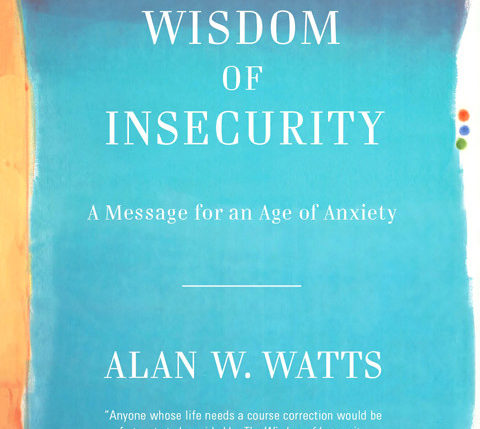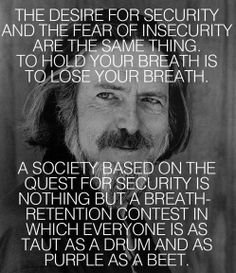
The Wisdom of Insecurity, and Reflections on Self Care
In The Wisdom of Insecurity: A Message for an Age of Anxiety, Alan Watts examines the ways in which we cope with the uncertainty of life and offers new perspective for a more fulfilled existence.
For me, chronic anxiety is like being filled with a constant, dreadful anticipation. It means overthinking things that I know are straight-forward, doubting my most sincere intentions, and basically assuming that the rest of the world thinks the worst about me. Paradoxically, it also involves a lot of self-blame and criticism for feeling these things in the first place. Most of all, it is incredibly self-involved.
In retrospect, I can see that I’ve always been a touch neurotic, prone to obsessive thoughts and becoming oblivious to the world around me. It wasn’t until a few years ago that those thoughts began to turn destructive and discourage me from social interaction. I saw a therapist for a while, but I stopped shortly after my best friend died in January of 2014.
Oddly enough, in spring of 2014 my anxiety began to dissipate without any real intention on my part. For one, I became determined to honor my friend’s death by living life more fully. I also ended a toxic relationship that had only catered to, rather than challenging, my anxieties. In any case, I began going out more; the warm weather invigorated me; I got a new, more fulfilling job; and I felt that I’d been somewhat “cured” of my anxiety.
A year later, and I find myself having mostly good days. Somehow, that makes it even more difficult when I do get stuck in a temporary web of anxiety. I’ve seen the light, I tell myself, so how did I end up back here in the dark? It’s easy to forget that I have a condition that requires preventive care, and that when that care is neglected, darkness soon follows.
A few months ago my brother recommended I read Alan Watts’ book The Wisdom of Insecurity: A Message for an Age of Anxiety, and the title immediately grabbed me. Surely, I thought, this will give me the tools I need to defeat my anxiety once and for all. I was drawn to his Eastern-leaning philosophies, and I found myself really attracted to the idea of embracing the insecure nature of life.
Watts points out that most of our anxieties and loneliness come from a relentless pursuit of security and an inability to be aware in the present. We have a habit of overanalyzing the past and thinking that the coincidental nature of the universe is a result of our own predictions. Conversely, we spend a lot of our time looking forward, thinking that our next bonus or vacation will guarantee us happiness. This conditioning prevents us from seeing that the only true experience is to be present.
It was Watts’ thoughts on joining the “I” and “me” that really resonated with me though. So much of my anxiety stems from observations, the constant inner-commentary which I always thought to be an asset, but I realized in the course of reading this book how much it separates me from those around me and prevents me from wholly experiencing life.
Sanity, wholeness, and integration lie in the realization that we are not divided, that man and his present experience are one, and that no separate “I” or mind can be found.
To understand music, you must listen to it. But so long as you are thinking, “I am listening to this music,” you are not listening.
How to shut off the internal monologue though? He doesn’t provide any direct advice, because the only solution is to really be actively present in each moment, and that can’t be taught.
The Wisdom of Insecurity made me realize how much of my life was spent analyzing the past and worrying about the future in an attempt to provide security for myself. Ironically enough, life’s insecurities only became that much more obvious, causing me to worry even more. This disjointedness also caused me to feel isolated and lonely because I wasn’t appreciating the present moments I was spending with others. The only solution was to accept that life is neither secure nor guaranteed, and allow those truths to guide me.
And you know what? It’s working.
I am now able to see my connection to the world around me, and am less motivated by self, but rather by existing harmoniously in and contributing to my environment. I realize that although we are encased in separate bodies, I am still connected to the people around me. This has made me more compassionate, and also taken some of the anxiety and pressure off of myself.
As I mentioned before though, chronic anxiety is not so easily or completely cured. 29 years of conditioning cannot be erased with a single intention. More than anything, I’ve learned that presence takes practice. These days, I keep my anxiety at bay by doing activities that force me to be present and that breed a sense of connection with others.
Although I’m sure they differ for everyone, here are a few that I’ve found to be helpful:
Writing
Perhaps it’s because I’ve done it for so long (as a child I journaled incessantly, and filled numerous notebooks with doodles, poetry, and original fiction), but writing has always allowed me to block out the world around me and simply be. It was my safety net, a place that belonged only to me that I could visit at will. Throughout adulthood I’ve journaled and written less, and I can now see how that’s taken a toll on my mental well-being. Still, as much as I will procrastinate about making time for creative written expression, whenever I do, I find that time slips away from me and before I know it hours have gone by.
Reading
Along the same lines, I’ve always been a reader. I would read while I ate, before I went to bed, on the bus ride home from school… But recently, working a job that requires I proofread for eight hours a day has discouraged me from doing it in my free time. I’ve made an effort to sneak in a few minutes where I can, usually during my lunch break and before bed, and am starting to force myself to turn off the television and pick up a book instead. I find that more often than not, I’m glad when I do.
Yoga
I have to stop myself from gushing here. I’ve been practicing yoga off and on for a few years, consistently for the last few months. I enjoy the personal satisfaction that comes with deepening a pose and witnessing my body become stronger and more flexible. Presence is required for yoga, as distractions may cause you to lose balance, forget to breathe, or miss an instruction. Classes breed a sense of support, rather than competition, with everyone just doing the best they can to cultivate a collective positive energy.
Meditation
Admittedly, I do not meditate as often as I should. Much like reading and writing, I always feel better when I do, but it’s difficult to motivate myself to do so on a regular basis. However, I recently began attending a weekly hour-long meditation workshop, and it’s become a great exercise in allowing myself to relax and simply be for an extended period of time. It’s so rewarding to come out of a meditation and realize that I had slipped unknowingly into a thoughtless wakefulness.
And now, something as simple as walking around the block can turn into a spiritual exercise in gratitude. As I tilt my chin upward, I can feel my skin absorb the rays of sunlight. The concrete beneath my feet is firm, and I can feel the muscles in my legs flexing as I shift weight. I take note of my sturdiness, my strength. Floral scents dance against my nose, and I turn to my left to notice a sprig of lavender. Traffic becomes my soundtrack, the humming engines my mantra.
We spend our entire lives seeking connection and belonging, but in fact it is all around us, just waiting to be found.

